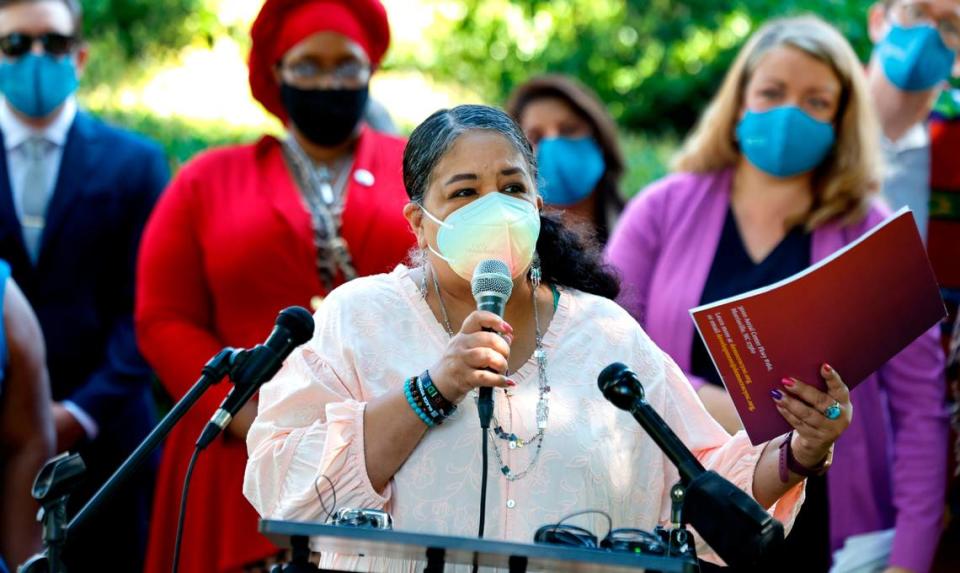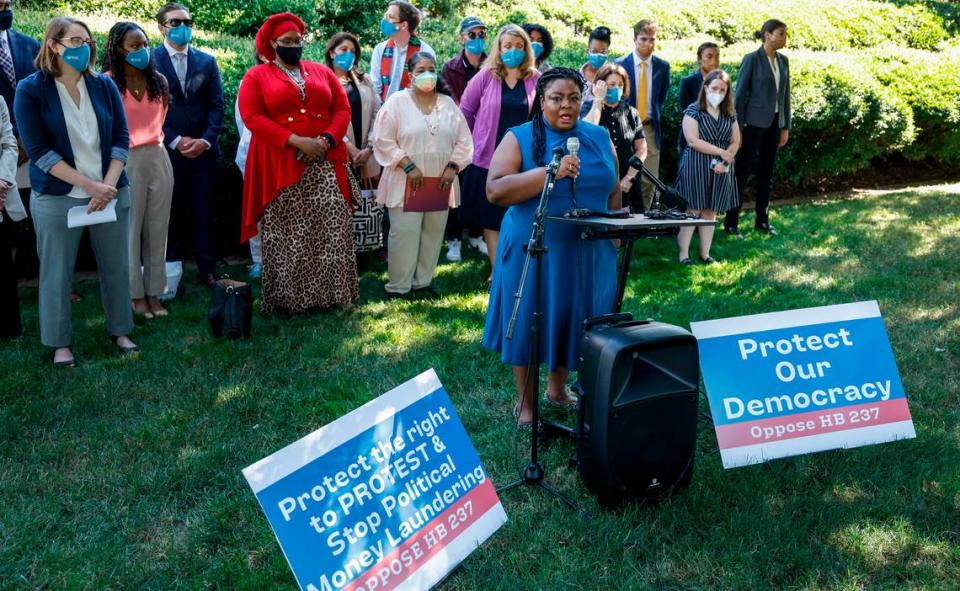NC is on the brink of changing its mask laws. Here’s what the bill would do.
After weeks of debating changes to current state law on masking in public, GOP lawmakers have settled on compromise language that House and Senate Republicans agree on.
The changes were originally proposed in the Senate last month as revisions to an existing House bill, to address what Republicans said were instances of people wearing masks to conceal their identity, sometimes at public protests, and in other cases while committing crimes.
State law has prohibited wearing a mask in public since the 1950s, when lawmakers passed a ban to crack down on the Ku Klux Klan, but there are a few exceptions that permit mask wearing. One of those exceptions, added by lawmakers during the pandemic, allows people to wear a mask “for the purpose of ensuring the physical health or safety of the wearer or others.”
Last month, Senate Republicans passed legislation that among other things, would have repealed that health and safety exception. The proposal drew widespread backlash, particularly from people who are immunocompromised or have other health conditions that require them to wear masks to protect themselves and others around them.

After a few House Republicans voiced concerns about repealing the health and safety exception, and the House voted not to agree with the Senate’s changes, the bill was tweaked in a conference committee consisting of Republicans from both chambers.
The bill that emerged keeps an exception allowing masks to be worn for health reasons, but rewrites it to make it narrower.
It also contains separate, unrelated changes to state campaign finance law, which critics have said is an attempt to make it easier for wealthy donors to contribute large sums to political committees and candidates in North Carolina ahead of the November election.
The bill cleared a final vote, in the House, Tuesday afternoon, and now goes to Gov. Roy Cooper, who is expected to veto it. If he does, that’ll set up override votes in both chambers.
Here’s what we know about how the bill, as it’s been rewritten, would change current law on public masking.
Does the bill allow masking for health reasons?
Yes, but not by keeping the existing health and safety exception as it was written.
Instead of broader language that currently allows any kind of mask to be worn to ensure “the physical health or safety of the wearer or others,” the exception would be changed to narrower language that only permits “medical and surgical grade” masks to be worn for the purpose of “preventing the spread of contagious disease.”

What about masking for health problems that aren’t contagious, like asthma?
It’s unclear what the effect of the new health exception, which is more narrowly written, will ultimately be.
Republicans have said there aren’t any known instances of people being prosecuted for wearing a mask for their health, in the nearly 70 years between the ban on mask wearing in public going into effect, and the health and safety exception being added to state law during the COVID-19 pandemic.
They argue that they trust law enforcement to exercise discretion, and that people masking to protect their health shouldn’t worry.
But critics of the bill have said the lack of clarity on how the law may be enforced has left people unsure of what is allowed and what isn’t.
Republican Rep. John Torbett told The News & Observer the N.C. Department of Health and Human Services says the new language allowing mask wearing only for the purpose of “preventing the spread of contagious disease” will also cover people “wearing a mask who may be immunocompromised or otherwise vulnerable populations that want to protect themselves from acquiring the disease.”
Torbett said this clarification from DHHS showed that the department interpreted the new language Republicans used as covering a broader group of immunocompromised and vulnerable people.
DHHS wanted to see the original health exception stay in place, but drafted three different versions of the exception to recommend lawmakers adopt instead, if they were adamant on changing it, Torbett said.
Torbett was one of the House Republicans who expressed concern about the original proposal to repeal the health exception entirely, and was part of the group of GOP lawmakers that negotiated the final version of the bill.
Can you be asked to remove your mask by the police?
Yes. Existing law already stated that anyone wearing a mask in public for health and safety reasons would have to remove their mask if asked by a law enforcement officer, either during a traffic stop or at a checkpoint or roadblock, or if the officer had “reasonable suspicion or probable cause during a criminal investigation.”
The bill as rewritten would remove the conditions of either a traffic stop, checkpoint, or roadblock, or if an officer has reasonable suspicion or probable cause, and simply states that anyone masking in public to prevent the spread of contagious disease shall “remove the mask upon request by a law enforcement officer.”
What if other people ask you to take your mask off?
The bill would also require people to “temporarily remove the mask upon request by the owner or occupant of public or private property where the wearer is present to allow for identification of the wearer.”
That provision is new, and critics have expressed concern that the inclusion of the word “occupant” could open the door to anyone who wants to know the identity of someone wearing a mask to ask them to temporarily take it off.
Which kinds of masks are allowed?
While existing law doesn’t specify any particular kind of masks that are allowed to be worn for health reasons, the new language allows only for “medical or surgical grade” masks to be worn in public, for the purpose of preventing the spread of contagious disease.
What else do the masking provisions of the bill address?
In addition to rewriting the health exception for mask wearing, the bill also establishes a sentencing enhancement for people who wear masks to conceal their identity while committing a crime.
If a person admitted that they wore a mask to conceal their identity for that purpose, or a jury found them guilty of doing so, they would be guilty of a misdemeanor or felony one class higher than the underlying crime that was committed.
Prosecutors would be required to identify the “facts that qualify the offense for an enhancement” in an indictment.
Another section of the bill, unrelated to masking laws, would increase criminal penalties for participating in a demonstration intended to impede traffic, or blocking emergency vehicles. Organizers of demonstrations that impede traffic would be civilly liable for any injuries or deaths that result from an emergency vehicle being obstructed.
NC Reality Check is an N&O series holding those in power accountable and shining a light on public issues that affect the Triangle or North Carolina. Have a suggestion for a future story? Email realitycheck@newsobserver.com
Under the Dome
Get the latest news about North Carolina politics from The News & Observer's award-winning team. Get the free digest sent to your inbox by signing up here.


